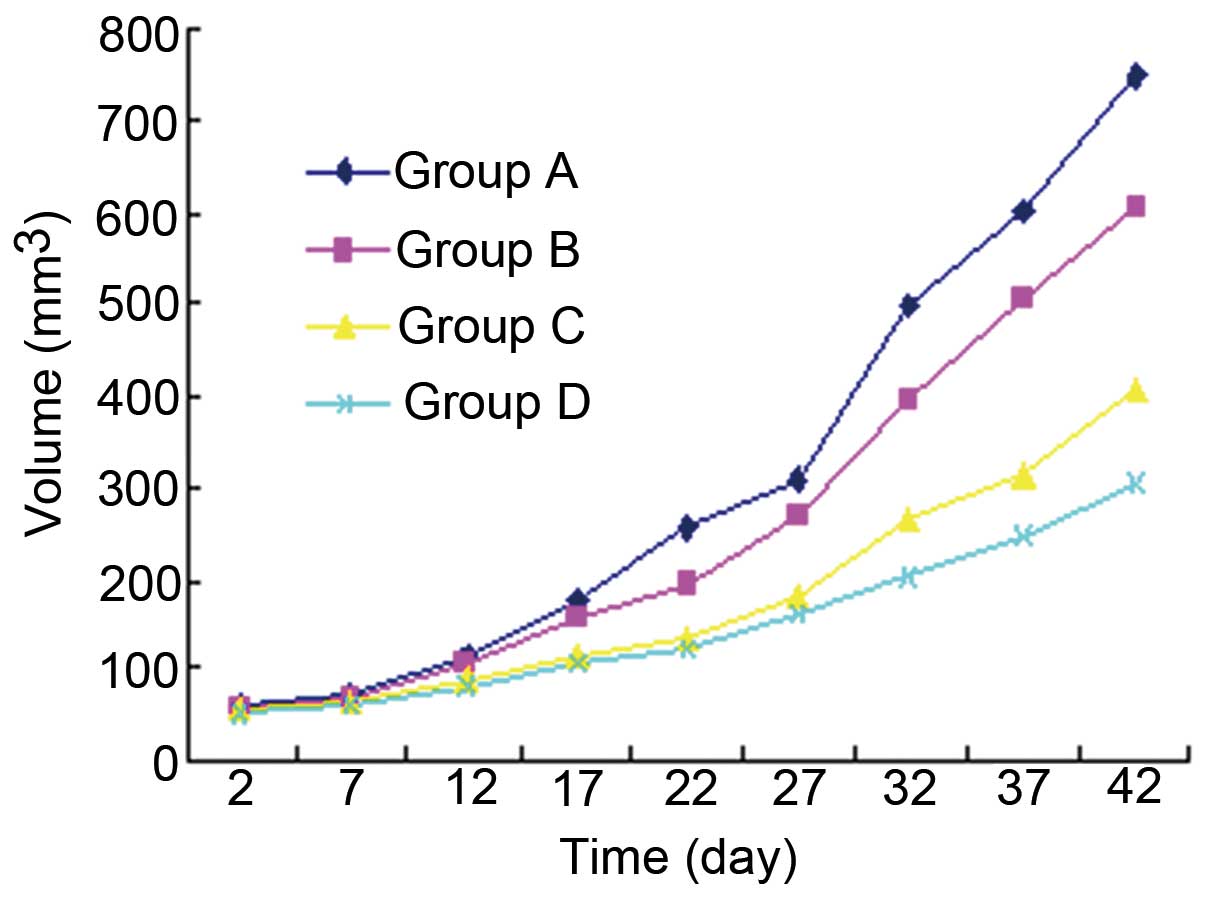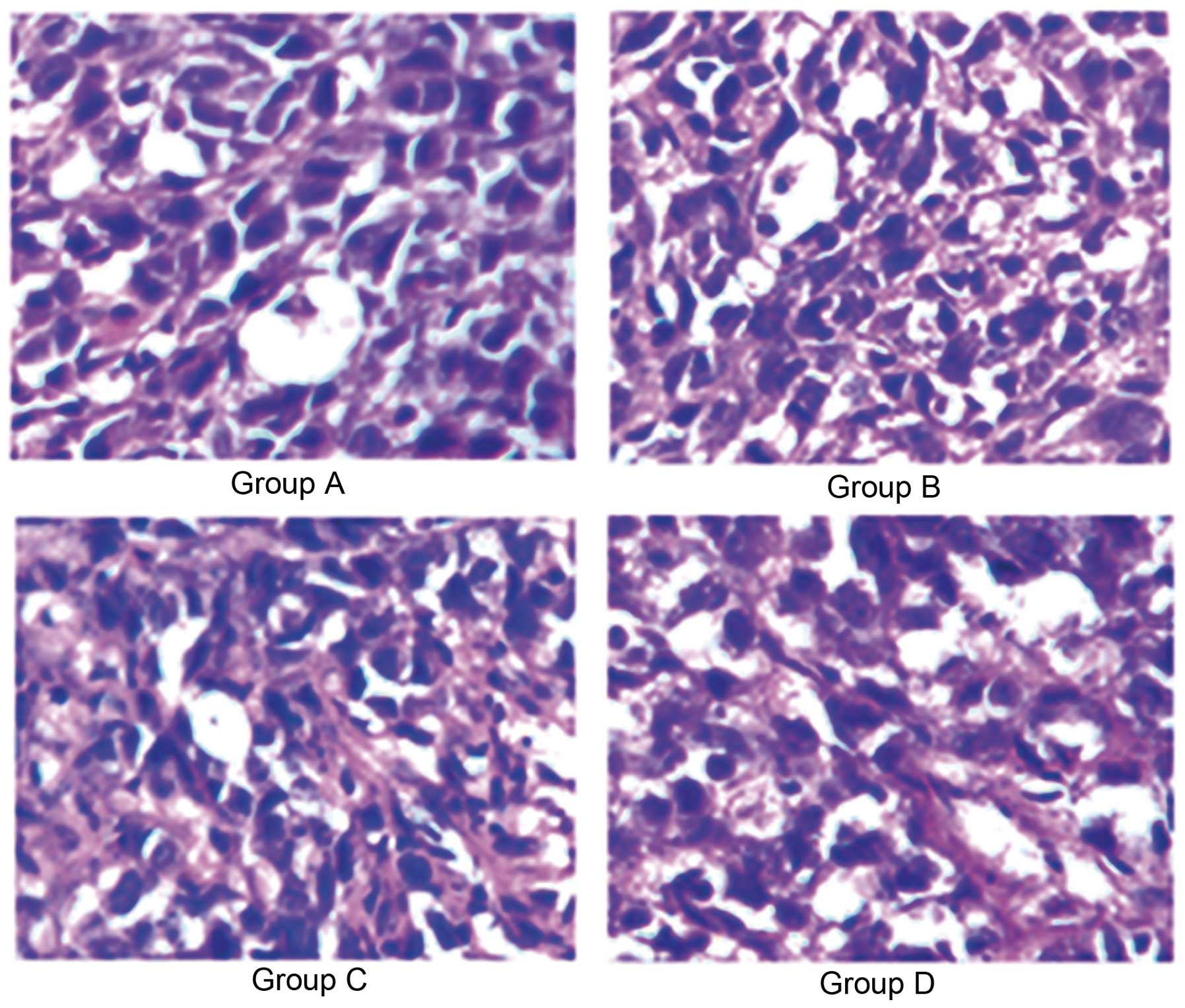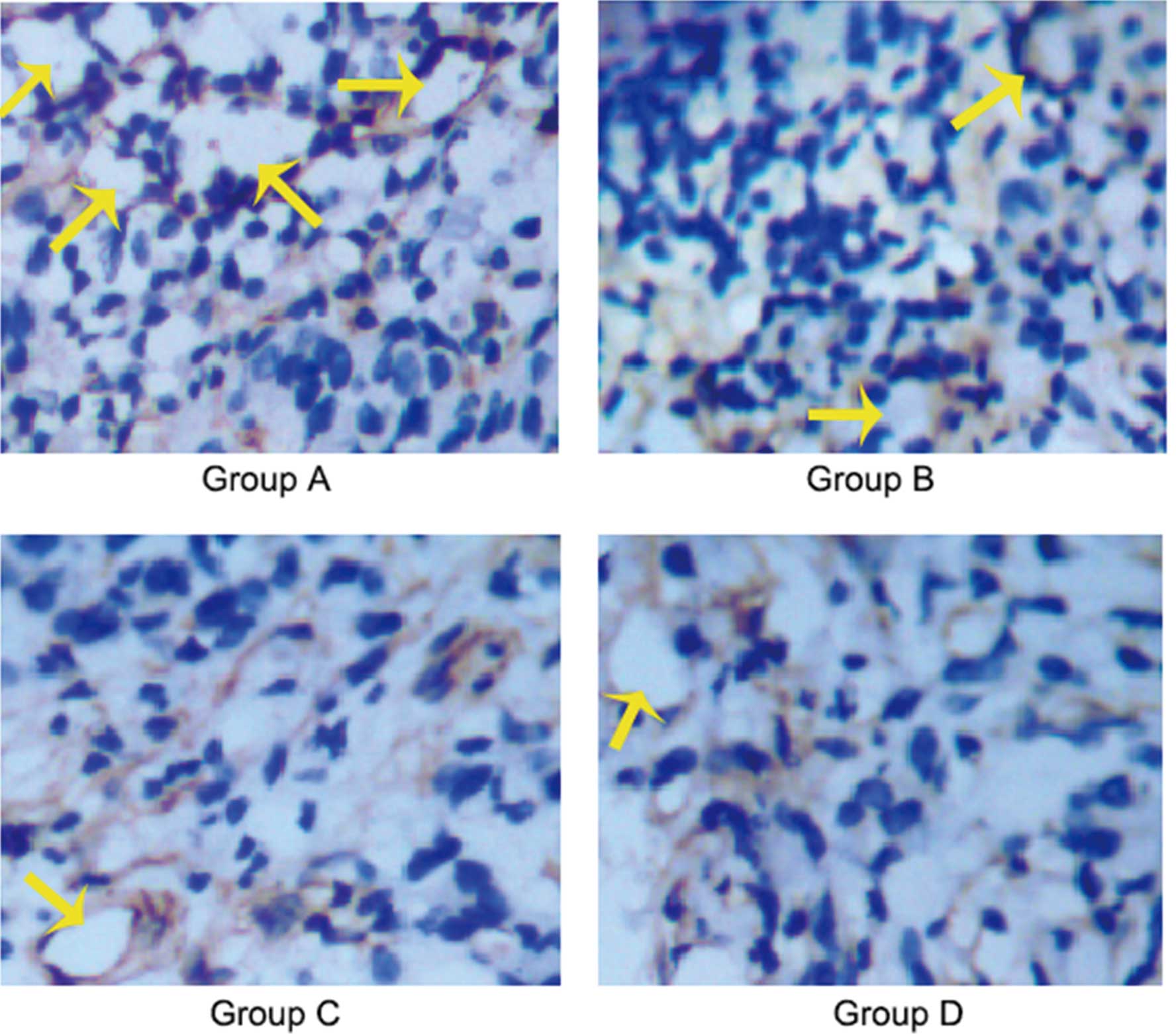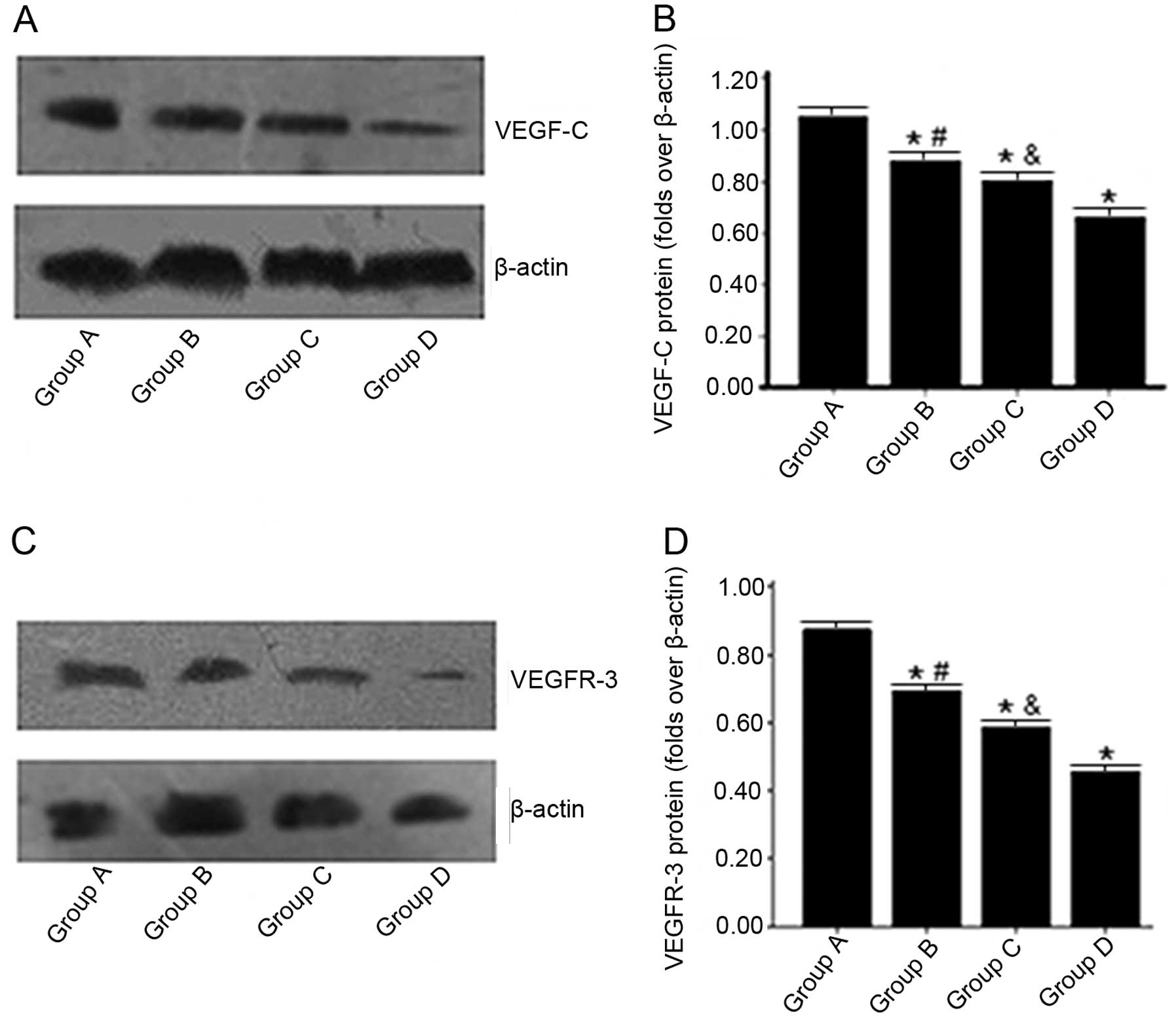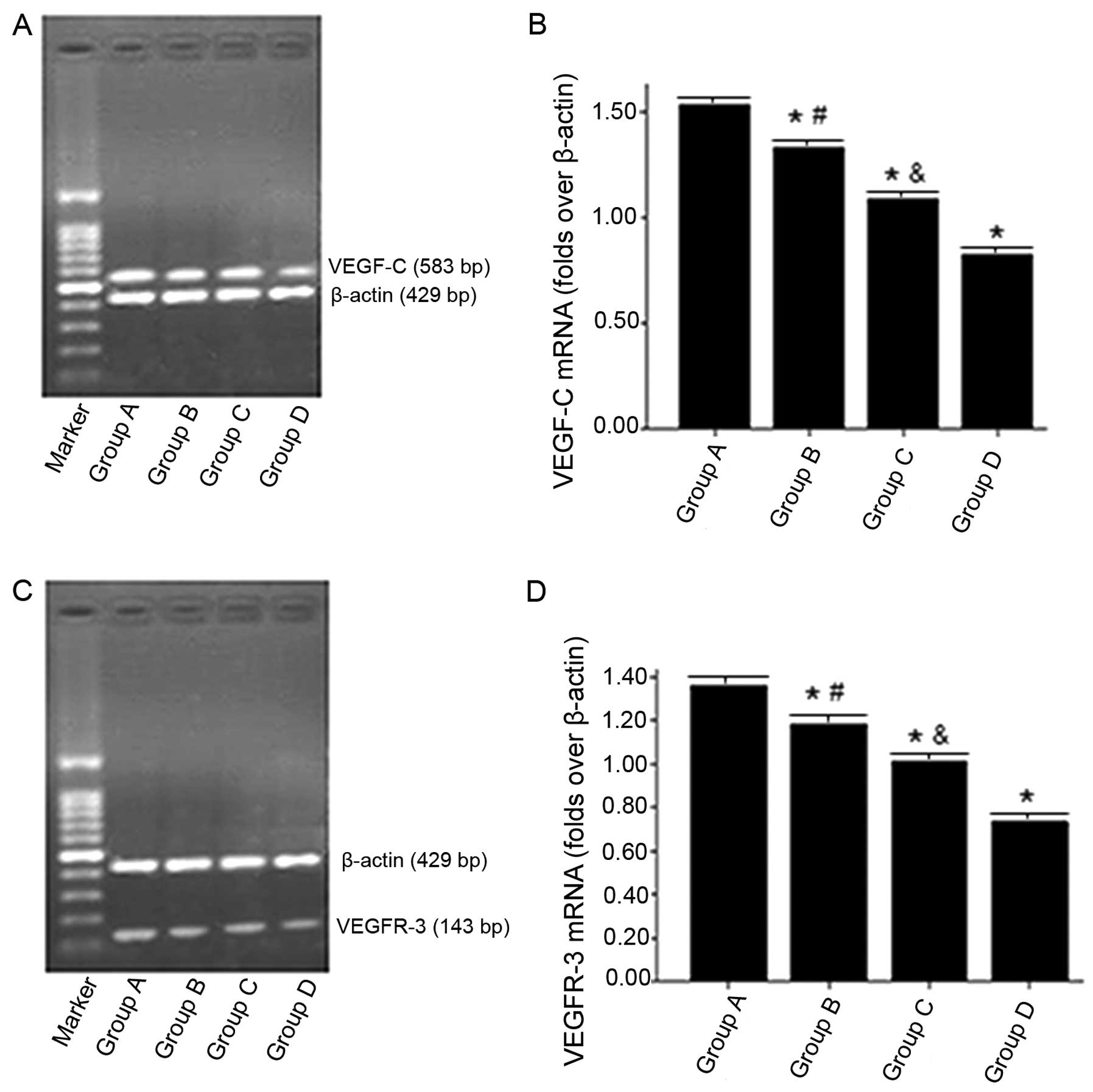|
1
|
Brenner H, Rothenbacher D and Arndt V:
Epidemiology of stomach cancer. Methods Mol Biol. 472:467–477.
2009. View Article : Google Scholar
|
|
2
|
Jemal A, Center MM, DeSantis C and Ward
EM: Global patterns of cancer incidence and mortality rates and
trends. Cancer Epidemiol Biomarkers Prev. 19:1893–1907. 2010.
View Article : Google Scholar : PubMed/NCBI
|
|
3
|
Macdonald JS, Smalley SR, Benedetti J, et
al: Chemoradiotherapy after surgery compared with surgery alone for
adenocarcinoma of the stomach or gastroesophageal junction. N Engl
J Med. 345:725–730. 2001. View Article : Google Scholar
|
|
4
|
Achen MG and Stacker SA: Molecular control
of lymphatic metastasis. Ann NY Acad Sci. 1131:225–234. 2008.
View Article : Google Scholar : PubMed/NCBI
|
|
5
|
Alitalo K, Tammela T and Petrova TV:
Lymphangiogenesis in development and human disease. Nature.
438:946–953. 2005. View Article : Google Scholar : PubMed/NCBI
|
|
6
|
Mumprecht V and Detmar M:
Lymphangiogenesis and cancer metastasis. J Cell Mol Med.
13:1405–1416. 2009. View Article : Google Scholar : PubMed/NCBI
|
|
7
|
McCarter MD, Clarke JH and Harken AH:
Lymphangiogenesis is pivotal to the trials of a successful cancer
metastasis. Surgery. 135:121–124. 2004. View Article : Google Scholar : PubMed/NCBI
|
|
8
|
Matsumoto M, Roufail S, Inder R, et al:
Signaling for lymphangiogenesis via VEGFR-3 is required for the
early events of metastasis. Clin Exp Metastasis. Apr 17–2013.(Epub
ahead of print).
|
|
9
|
Saltiel AR and Olefsky JM:
Thiazolidinediones in the treatment of insulin resistance and type
II diabetes. Diabetes. 45:1661–1669. 1996. View Article : Google Scholar : PubMed/NCBI
|
|
10
|
He Q, Pang R, Song X, et al: Rosiglitazone
suppresses the growth and invasiveness of SGC-7901 gastric cancer
cells and angiogenesis in vitro via PPARγ dependent and independent
mechanisms. PPAR Res. 2008:6498082008.PubMed/NCBI
|
|
11
|
Zhang L, Hu JF, Li GQ, Xiao X and Su Q:
Rosiglitazone reverses mitomycin C resistance in human gastric
cancer cells. Am J Med Sci. 343:382–387. 2012. View Article : Google Scholar : PubMed/NCBI
|
|
12
|
Talbert DR, Allred CD, Zaytseva YY and
Kilgore MW: Transactivation of ERα by Rosiglitazone induces
proliferation in breast cancer cells. Breast Cancer Res Treat.
108:23–33. 2008.
|
|
13
|
Miao R, Xu T, Liu L, et al: Rosiglitazone
and retinoic acid inhibit proliferation and induce apoptosis in the
HCT-15 human colorectal cancer cell line. Exp Ther Med. 2:413–417.
2011.PubMed/NCBI
|
|
14
|
Cerquetti L, Sampaoli C, Amendola D, et
al: Rosiglitazone induces autophagy in H295R and cell cycle
deregulation in SW13 adrenocortical cancer cells. Exp Cell Res.
317:1397–1410. 2011. View Article : Google Scholar : PubMed/NCBI
|
|
15
|
Chiu SJ, Hsaio CH, Tseng HH, et al:
Rosiglitazone enhances the radiosensitivity of p53-mutant HT-29
human colorectal cancer cells. Biochem Biophys Res Commun.
394:774–779. 2010. View Article : Google Scholar : PubMed/NCBI
|
|
16
|
Lyon CM, Klinge DM, Do KC, et al:
Rosiglitazone prevents the progression of preinvasive lung cancer
in a murine model. Carcinogenesis. 30:2095–2099. 2009. View Article : Google Scholar : PubMed/NCBI
|
|
17
|
Yee LD, Williams N, Wen P, et al: Pilot
study of rosiglitazone therapy in women with breast cancer: effects
of short-term therapy on tumor tissue and serum markers. Clin
Cancer Res. 13:246–252. 2007. View Article : Google Scholar : PubMed/NCBI
|
|
18
|
Esteva FJ, Moulder SL, Gonzalez-Angulo AM,
et al: Phase I trial of exemestane in combination with metformin
and rosiglitazone in nondiabetic obese postmenopausal women with
hormone receptor-positive metastatic breast cancer. Cancer
Chemother Pharmacol. 71:63–72. 2013. View Article : Google Scholar : PubMed/NCBI
|
|
19
|
Luconi M, Mangoni M, Gelmini S, et al:
Rosiglitazone impairs proliferation of human adrenocortical cancer:
preclinical study in a xenograft mouse model. Endocr Relat Cancer.
17:169–177. 2010. View Article : Google Scholar : PubMed/NCBI
|
|
20
|
Dicken BJ, Bigam DL, Cass C, Mackey JR,
Joy AA and Hamilton SM: Gastric adenocarcinoma: review and
considerations for future directions. Ann Surg. 241:27–39.
2005.PubMed/NCBI
|
|
21
|
Ohno M, Nakamura T, Kunimoto Y, Nishimura
K, Chung-Kang C and Kuroda Y: Lymphagenesis correlates with
expression of vascular endothelial growth factor-C in colorectal
cancer. Oncol Rep. 10:939–943. 2003.PubMed/NCBI
|
|
22
|
Mangelsdorf DJ, Thummel C, Beato M, et al:
The nuclear receptor superfamily: the second decade. Cell.
83:835–839. 1995. View Article : Google Scholar : PubMed/NCBI
|
|
23
|
Siersbaek R, Nielsen R and Mandrup S:
PPARγ in adipocyte differentiation and metabolism - novel insights
from genome-wide studies. FEBS Lett. 584:3242–3249. 2010.
|
|
24
|
Nedergaard J, Petrovic N, Lindgren EM,
Jacobsson A and Cannon B: PPARγ in the control of brown adipocyte
differentiation. Biochim Biophys Acta. 1740:293–304. 2005.
|
|
25
|
Fernyhough ME, Okine E, Hausman G, Vierck
JL and Dodson MV: PPARγ and GLUT-4 expression as developmental
regulators/markers for preadipocyte differentiation into an
adipocyte. Domest Anim Endocrinol. 33:367–378. 2007.
|
|
26
|
Elrod HA and Sun SY: PPARγ and apoptosis
in cancer. PPAR Res. 2008:7041652008.
|
|
27
|
Kim S, Lee JJ and Heo DS: PPARγ ligands
induce growth inhibition and apoptosis through p63 and p73 in human
ovarian cancer cells. Biochem Biophys Res Commun. 406:389–395.
2011.
|
|
28
|
Zhou J, Zhang W, Liang B, et al: PPARγ
activation induces autophagy in breast cancer cells. Int J Biochem
Cell Biol. 41:2334–2342. 2009.
|
|
29
|
Zaytseva YY, Wallis NK, Southard RC and
Kilgore MW: The PPARγ antagonist T0070907 suppresses breast cancer
cell proliferation and motility via both PPARγ-dependent and
-independent mechanisms. Anticancer Res. 31:813–823. 2011.
|
|
30
|
Kitamura S, Miyazaki Y, Hiraoka S, et al:
PPARγ inhibits the expression of c-MET in human gastric
cancer cells through the suppression of Ets. Biochem Biophys
Res Commun. 265:453–456. 1999.
|
|
31
|
Takahashi H, Hosono K, Uchiyama T, et al:
PPARγ ligand as a promising candidate for colorectal cancer
chemoprevention: a pilot study. PPAR Res. 2010:2578352010.
View Article : Google Scholar
|
|
32
|
Wood WM, Sharma V, Bauerle KT, et al:
PPARγ promotes growth and invasion of thyroid cancer cells. PPAR
Res. 2011:1717652011. View Article : Google Scholar
|
|
33
|
Sato H, Ishihara S, Kawashima K, et al:
Expression of peroxisome proliferator-activated receptor (PPAR)γ in
gastric cancer and inhibitory effects of PPARγ agonists. Br J
Cancer. 83:1394–1400. 2000.
|
|
34
|
Lu J, Imamura K, Nomura S, et al:
Chemopreventive effect of peroxisome proliferator-activated
receptor γ on gastric carcinogenesis in mice. Cancer Res.
65:4769–4774. 2005.
|
|
35
|
Chen J, Zhi Y, Chang X, Zhang S and Dai D:
Expression of ADAMTS1 and its correlation with angiogenesis in
primary gastric cancer and lymph node metastasis. Dig Dis Sci.
58:405–413. 2013. View Article : Google Scholar : PubMed/NCBI
|
|
36
|
Wu H, Xin Y, Xu C and Xiao Y: Capecitabine
combined with (−)-epigallocatechin-3-gallate inhibits angiogenesis
and tumor growth in nude mice with gastric cancer xenografts. Exp
Ther Med. 3:650–654. 2012.
|
|
37
|
Fidler IJ: The biology of cancer
metastasis. Semin Cancer Biol. 21:712011. View Article : Google Scholar
|
|
38
|
Al-Rawi MA and Jiang WG: Lymphangiogenesis
and cancer metastasis. Front Biosci. 16:723–739. 2011. View Article : Google Scholar
|
|
39
|
Raica M, Cimpean AM and Ribatti D: The
role of podoplanin in tumor progression and metastasis. Anticancer
Res. 28:2997–3006. 2008.PubMed/NCBI
|
|
40
|
Yu JW, Wu JG, Tajima Y, et al: Study on
lymph node metastasis correlated to lymphangiogenesis, lymphatic
vessel invasion, and lymph node micrometastasis in gastric cancer.
J Surg Res. 168:188–196. 2011. View Article : Google Scholar : PubMed/NCBI
|
|
41
|
Makinen T, Veikkola T, Mustjoki S, et al:
Isolated lymphatic endothelial cells transduce growth, survival and
migratory signals via the VEGF-C/D receptor VEGFR-3. EMBO J.
20:4762–4773. 2001. View Article : Google Scholar : PubMed/NCBI
|
|
42
|
Van Trappen PO, Steele D, Lowe DG, et al:
Expression of vascular endothelial growth factor (VEGF)-C and
VEGF-D, and their receptor VEGFR-3, during different stages of
cervical carcinogenesis. J Pathol. 201:544–554. 2003.PubMed/NCBI
|
|
43
|
Su JL, Chen PS, Chien MH, et al: Further
evidence for expression and function of the VEGF-C/VEGFR-3 axis in
cancer cells. Cancer Cell. 13:557–560. 2008. View Article : Google Scholar : PubMed/NCBI
|
|
44
|
Takizawa H, Kondo K, Fujino H, et al: The
balance of VEGF-C and VEGFR-3 mRNA is a predictor of lymph node
metastasis in non-small cell lung cancer. Br J Cancer. 95:75–79.
2006. View Article : Google Scholar : PubMed/NCBI
|
|
45
|
Arigami T, Natsugoe S, Uenosono Y, et al:
Vascular endothelial growth factor-C and -D expression correlates
with lymph node micrometastasis in pN0 early gastric cancer. J Surg
Oncol. 99:148–153. 2009. View Article : Google Scholar : PubMed/NCBI
|
|
46
|
Liu ZY, Qiu HO, Yuan XJ, et al:
Suppression of lymphangiogenesis in human lymphatic endothelial
cells by simultaneously blocking VEGF-C and VEGF-D/VEGFR-3 with
norcantharidin. Int J Oncol. 41:1762–1772. 2012.PubMed/NCBI
|















